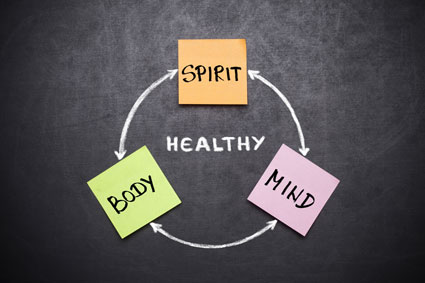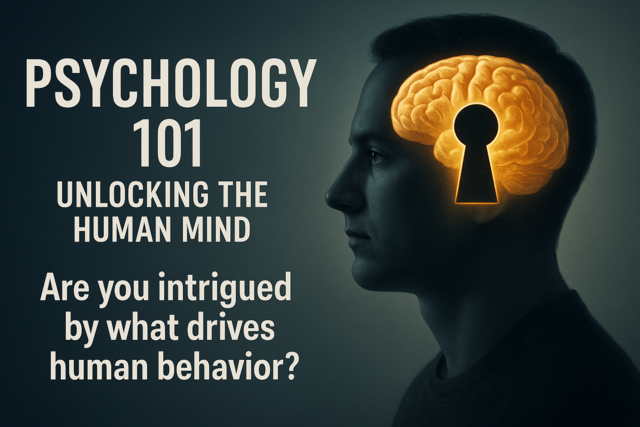The Importance of Human Connections in Your Pursuit of Happiness
With few exceptions, human beings need contact with other human beings. Studies have shown human beings subjected to prolonged isolation, such as prisoners in solitary confinement, or individuals who live or work in extremely remote conditions, become unstable. Hallucinations, typically visual and/or auditory, are common. Tactile and olfactory hallucinations can occur, as well. Visual hallucinations often begin with flashes of bright lights in one's peripheral vision, which disappear when one turns to look at them.
Auditory hallucinations may include music, indistinct voices, or sounds of someone walking around in another room when no one is present. Those with illnesses, such as severe chronic depression or bipolar disorder, may experience hallucinations, but being subjected to trauma, distress, severe pain, or extreme grief can cause temporary hallucinations, as well.
Children raised in isolation without socialization or human contact do not develop normally. Perhaps the most famous case of such extreme abuse is "Genie." Born in 1957, Genie (not her real name) was confined to a bedroom for over a decade until she was rescued at age 13 by a social worker. Most of the time, Genie was kept naked, strapped to a portable "potty chair" and beaten by her father if she dared make a sound. When she was finally found and rescued, she was unable to talk and exhibited an odd gait which researchers called her "bunny" walk, so named for the way Genie held her hands in front of her as she shuffled along.
Other cases of feral children have been recorded as well; while some human normalcy might be restored to such a child, if rescued soon enough, rescued feral children typically fail to become "fully" or "normally" human, particularly in regards to interpersonal relationships and/or speech. (There is a window of time for humans to learn speech; researchers have set the cutoff at age 6, but Genie managed to learn some speech after her rescue.)
Despite our innate need for contact with others, not all human contact is positive. In fact, some is downright harmful. Unwanted physical contact, for example, whether for purposes of sex or violence, is not positive human contact! Neither are verbally or psychologically abusive interactions. In this article, we'll explore the importance of positive human connections and how to achieve them.
Seeking Supportive Associations
It matters who we choose to surround ourselves with. In some instances, such as work or school, we may not have much of a choice regarding who we spend our time with. We do, however, have a choice regarding how much importance we place on those relationships and how much influence we allow others to have over us.
As anyone who's been exposed to workplace politics knows, it can seem as though your superiors' only goal is to make your life miserable, and your co-workers are constantly looking for a weakness or flaw in your character to exploit. Your sense of self-worth can suffer greatly in such an environment, if you allow the negativity to influence you. (The same can be said of being trapped in a hostile or unsupportive relationship or family environment.)
We always have a choice in how to respond to a situation (remember the equation E+R=O?), and as mentioned previously, it is possible to change your life by changing your attitude and outlook. You also have the ability to choose what stimuli in your life receive your attention. For example, if you have a negative work environment, the most complete solution would be to obtain another job; however, that often isn't possible or practical. If you must remain in a less-than-desirable situation, you'll need a strategy.
First, understand you are not responsible for how others feel. It is not really possible to "make" another person feel a certain way. We choose (there's that word again!) to feel angry or insulted when we allow another's words or actions to influence us emotionally. Most of us, at one time or another, have said to someone, "You are making me so angry!" without thinking about what that really means. If you're being "made" to do something, you're being forced – essentially, you are not in control. Someone may be able to force you to perform activities or make statements you don't wish to participate in, but feelings are the one thing truly under our individual control.
Second, work on being secure in your own abilities and talents. Most of us are overly self-depreciating when confronted with praise for our accomplishments. A simple, gracious "Thank you" is the best response to praise. Accept and appreciate your abilities; and do not allow others to downplay your contributions (but please avoid being arrogant!).
Sometimes, others who are resentful or jealous of your talents will do their best to demean you and downplay your accomplishments. Be polite, but don't take any garbage. There is a difference between constructive criticism and purely spiteful or negative criticism; constructive criticism usually contains useful information, while other types of criticism are just derogatory.
Fourth, your best defense against toxic people is a positive, strong outlook and manner. Again, we are not speaking of arrogance, but of a true understanding of, and appreciation for, your own abilities.
A good rule to follow is to do more listening than talking. Gravitate toward those who make positive statements and involve others in their circle. Avoid braggarts, negative people, and "know-it-alls." As mentioned earlier in this course, it is helpful to cultivate relationships with those who either know more than you do, or have qualities you wish to emulate. Also encourage reciprocal relationships; again, relationships don't always run straight 50/50, but overall, the average of effort, energy, and commitment should be equivalent. If not, re-evaluate the relationship, repair it, if the other party is willing and able, and/or cut your losses, if necessary.
Identifying and Avoiding Toxic Relationships
Despite our best efforts, we sometimes find ourselves involved in toxic relationships. How can you tell if you're in such a relationship in the first place?
One of the biggest clues is this: toxic relationships are typically one-sided, and never in your favor. Toxic people are basically self-centered, hostile, and manipulative (often in a passive-aggressive way). An example of such a person is sometimes called a "control freak" – someone who feels they must be in charge of everyone and everything around them, and typically insists they'll be "happy" once their surroundings are "perfect". Rest assured, a control freak will never be satisfied with anyone or anything around them, so your best course of action is to remove such a person from your life (or remove yourself from theirs).
Toxic people usually have a very negative life-outlook. The sun could be shining, the birds singing, and they will find something to complain about. No matter how many times you attempt to cheer up such a person, their sour demeanor will not change. Believe us, it probably never will, and your best bet is to stop trying to show such people the "silver lining." To them, it will always be gun-metal gray.
Toxic friends will have loads of ideas and advice for everyone on how to run their lives, but they'll refuse to follow (or usually even listen to) any advice from others. "Talking over" or "talking at" others is typical; toxic people don't participate in conversations, so much as lecture others and wait for their turn to speak.
If you notice these traits in a new acquaintance, our advice is to run away immediately! Seriously, the sooner you end such an association, the better off you'll be.
Of course, the best way to minimize the damage from contact with toxic people is to recognize them before you engage, so you can avoid the situation altogether. Body language, tone of voice, and content of speech are all clues.
Since none of us can live in a vacuum, you don't want to become an "ice cube," completely closed off to interpersonal relationships. You do, however, owe it to yourself to avoid toxic relationships and extricate yourself from those you currently have.
Toxic relationships are not only unfulfilling, they have negative effects on your psyche as well. Consider cases of people who stay in physically abusive relationships. People with a healthy set of beliefs typically don't understand why a battered spouse would stay and allow the abuse to continue. (Usually, there is a component of learned helplessness in such situations.) Life patterns are difficult to break, but doing so is ultimately very worthwhile,
Being Protective of Your Time
Being protective of your time is not necessarily selfish. In fact, doing so properly is necessary if you hope to maximize your time and abilities.
Your ability to be protective of your time begins with the ability to say "no" easily to unnecessary or unimportant "Level 3" obligations, and to properly evaluate and refuse higher-level activities you do not have the time or bandwidth for. Be firm, but polite - those around you may resent your new behavior and commitment to protecting your time, but ultimately, they will benefit, too. Being choosy about how you spend your time will increase your energy, as well as giving you a sense of calm about your daily life, giving you more patience and time for those who mean the most in your life.
Of course, as Scottish poet Robert Burns wrote, "The best-laid schemes o' mice an 'men Gang aft agley ("go often awry)." Be willing to compromise, if need be. You'll find if you are, for the most part, in charge of your time, you'll handle emergencies more calmly and easily). Just make sure to avoid getting in (or returning to) the habit of rescuing those around you who fail to plan, then expect you to "fix" their problem.
The "Drama" Trap
Drama can be a wonderful on stage or screen, but if asked, most of us would insist the last thing we want in our lives is drama. If this is true, why do so many people seem to have lives full of crises?
Our brains crave stimulation. Brain chemicals called neurotransmitters, which carry messages in the brain between neurons, are responsible in part for mood and pain control as well as basic biological functions such as breathing. Natural activities or substances, such as exercising or certain types of food, can cause a reaction in these neurotransmitters, which in turn uplifts our mood. If you become extremely upset or in danger, your neurotransmitters will adjust accordingly to comfort you or energize you, respectively.
The basis for all addictions is brain chemistry. Any and all substances we partake of, including food, set off a reaction in the brain. Likewise, physical conditions, such as injury, change our brain chemistry, as well. The brain regulates these neurotransmitters, releasing and cycling them in appropriate proportions at the correct time. When these neurotransmitters are not self-regulating properly, the individual may experience physical and/or psychological issues, such as addiction or depression.
Someone with a deficiency or problem with a specific neurotransmitter, such as serotonin, may turn to drugs or alcohol to artificially stimulate neurotransmitters into activity (we usually call this "self-medicating"). After long-term usage, the addicted brain stops making the neurotransmitter being "replaced" by the drug being used – it's gotten the message it doesn't need to make that any more, since it's being supplied artificially. This is why drug addicts and alcoholics experience withdrawal symptoms when they stop, and why a stable amount of usage eventually fails to work as intensely as use continues.
Likewise, people can become addicted to certain emotions, such as high-intensity conflict – what we call "life drama." (People can become addicted to a variety of emotions, including sadness, grief, and fear – one reason why scary movies and haunted houses are so popular.) When confronted with a difficult situation, our brain starts pumping neurotransmitters to help us face the conflict. But, as we've mentioned before, your brain gets its cues of situation intensity from you. And guess what? The intensity of the conflict or problem is all in how you perceive it. Some problems, such as the sudden death of a family member, or having the water pipes in your house burst at 3 a.m., are definitely more intense than others, but you can still control the level to which such events affect you.
If you are addicted to drama, you'd likely have the same intensity of reaction to any event, whether it's the wind knocking over the empty garbage can outside, or getting fired from your job. If you have no drama of your own, you'll find some! Chances are, you'll tend to draw people to you who have lots of drama in their lives. Have you ever noticed how some people seem to "draw trouble" to themselves? (Maybe it's you.) This is your subconscious creating the very situation you crave . Even if you deny wanting drama in your life, your brain is somehow addicted to it, and it will pursue its "fix," regardless of what you think you want.
So how does one stop the drama cycle? You decide to. That's all there is to it! Decide to stop, and do so. Refuse to become emotionally involved in other people's problems (this does not mean stop helping others, just stop feeling all their emotions for them!). Do not allow situations, large or small, to overwhelm you. A specific time period of "freaking out" may be necessary and acceptable, depending on the situation, but ultimately you must take control of whatever aspects of the situation you can and regain control. You can still feel upset and process your emotions, but it is not necessary to allow them to cripple you.
You may feel some "withdrawal" symptoms, such as depression or hyperactivity, when you stop the "drama drug." Your brain is missing its neurotransmitter fix! Don't give in, though – such desires for drama will dissipate, and one day soon you'll wonder why you ever let drama into your life at all.
Some Benefits of Saving Your Energy for Important Things
As mentioned earlier in this article, learning to save your energy for life's important concerns gives a greater sense of control and peace to daily existence. In addition, you'll have greater confidence in your abilities, which will increase with each success. The initial "adjustment period" may be rough on you and those around you, but when your energy and ability to do more for those you care about begins to increase, the positive results will make all the growing pains worthwhile.































